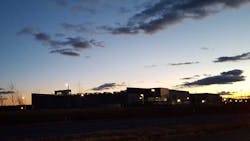Digital Realty Sees New Momentum in Data Center Leasing in Ashburn
Digital Realty has leased 38 megawatts of data center capacity in Northern Virginia over the past five months, turning in a dominant performance in the industry’s largest and most competitive market. As a result, the company says its development pipeline in Ashburn is 100 percent pre-leased in a region grappling with an ample supply of data center space.
In its earnings call last week, Digital Realty said that it leased 18 megawatts of capacity in Ashburn in the fourth quarter of 2019, and has signed an additional 20 megawatts of deals in the first quarter of 2020.
“The Ashburn pendulum has swung back a bit quicker than anyone expected a year ago,” said Matt Mercier, Senior Vice President of Finance at Digital Realty. “The tremendous scale and the connectivity of our Ashburn Connected Campus outperformed in a crowded, competitive backdrop. On the heels of additional activities since year-end, our Northern Virginia active development pipeline is now 100% pre-leased.
“The market really came back in the second half of the year,” Mercier. “Absorption was down a bit from 2018, but was actually higher than 2017 overall.”
Northern Virginia continues to be the most active data center market on earth, with leasing volumes that are the envy of every other region. The region is home to more than 100 data centers and more than 10 million square feet of data center space. Cloud platforms covet proximity to “Data Center Alley” in Ashburn, the world’s busiest Internet intersection.
But the data center business in Ashburn’s Data Center Alley continues to seek out the “new normal” in the aftermath of epic leasing in 2018, which triggered a burst of data center construction. A record 270 megawatts (MWs) of capacity was leased in Northern Virginia in 2018, including a single 72-megawatt deal.
As hyperscale operators seek to digest their 2018 leasing, landlords are adapting to more rational levels of demand and a larger pool of supply (see Northern Virginia: Less Hyper But Still Plenty of Scale for more).
ServerCentral Turing Group is Newest Ashburn Client
Concerns about oversupply inevitably lead to a focus on pricing, especially in a highly-competitive market like Northern Virginia. Ashburn has seen an influx of new players backed by private capital, and some market observers expected them to quickly gain share. To be sure, several new entrants have won business in Data Center Alley, but it’s clear that the leading incumbent hasn’t been slowed by competition.
Digital Realty is the largest player in Northern Virginia, with more than 370 megawatts of capacity spread across three existing campuses in Ashburn. The company owns several prime parcels of land in Loudoun County, and is developing a large new campus in Manassas in Prince William County.
The company’s 2020 leasing includes 8 megawatts of capacity in its commissioned space, and 12 megawatts in its development portfolio. All of the inventory Digital Realty currently has under construction has been pre-leased.
Digital Realty’s newest Ashburn customer is ServerCentral Turing Group, a managed hosting specialist which is a tenant in several of its Chicago buildings. ServerCentral has several anchor customers looking to deploy hybrid IT capacity on the East Coast, and liked the connectivity story in Ashburn.
“We build from the network up,” said Chris Rechtsteiner, Vice President of Marketing at ServerCentral Turing Group. “You need to recognize that you’re going to be cross-connecting everywhere. That’s critical in how we create solutions, and it’s commonplace in the Ashburn market.”
There are lots of providers in Ashburn, and ServerCentral explored its options. “Sure, we looked around,” said Rechtsteiner. “There’s so much innovation, and we wanted to see where the edges are being pushed. At the end of the day, it comes down to who you know, and who you trust. Digital Realty recognizes what we need, and how we want to do it.”
Expansion Options Matter to Tenants
A key selling point for Digital Realty is the ability for customers to “land and expand” – make an initial commitment, with the option to add additional capacity in adjacent space on the campus.
“We need a really solid controlled environment, and we want to expand as we grow,” said Rechtsteiner. “We know we’re going to need more space within a 12- to 18-month time frame.”
This capability is a strategic priority for Digital Realty, according to Corey Dyer, the company’s Executive Vice President, Global Sales & Marketing.
“We’ve got some customers that are already installed there, and they’re looking for adjacency in the campus, sometimes in the same building,” said Dyer. “We’re working through the Tetris game of how we accommodate the demand, and make sure we continue to build on our success in Ashburn.”
This is an area where the size of the company’s 238-acre Digital Loudoun campus provides strategic options, especially with hyperscale customers deploying specialized workloads.
A look at the newest phase of Digital Realty’s huge Digital Loudoun campus, spanning Building N and Building P. (Photo: Rich Miller)
“The work we’ve done in (Ashburn) with our master plans and our land banking allows us to be very prudent on how we can bring infrastructure to our customers in a very balanced manner,” said Greg Wright, the Chief Investment Officer for Digital Realty. “There are new types of infrastructure coming to market. With AI and machine learning becoming more prevalent, all of these major providers want to be in proximity to their existing infrastructure.
“We’ve done work to master-plan the right of ways (for fiber cabling), and really think through how we can future-proof their existing assets and provide a path for them to grow and launch new services. It’s something that’s very unique in that market.”
Test-Driving Immersion: The Data Center of the Future?
As powerful AI hardware drives higher rack power densities, Digital Realty is also using its Ashburn campus to prepare for future changes in data center cooling. It is partnering with Submer on a data center environment using single-phase immersion cooling in Digital Realty’s massive Building L in Ashburn.
A demonstration of Submer immersion cooling technology in Digital Realty’s Building L in Ashburn, Virginia. (Photo: Digital Realty)
Submer was founded in 2015, and cools servers by immersing them in dielectric fluid, an approach that can manage extreme power density and also offers potential economic benefits by allowing data centers to operate servers without a raised floor, computer room air conditioning (CRAC) units or chillers.
Submer says its SmartPodX enclosure can cool compute densities exceeding 100 kW per rack. The SmartPod demo in Ashburn was installed with the help of precision cooling specialist Compu Dynamics.
“We are excited by the prospects of working with companies like Submer and others, not only to meet the new requirements of the data center, but to aid other customer priorities such as sustainability that can be met by innovating our approach to our cooling infrastructure,” Digital Realty said.
Whatever the form factor, the improved leasing at Digital Realty is a hopeful sign for market dynamics in Northern Virginia.
“The Ashburn market is not entirely out of the supply and demand woods just yet, but we remain bullish on the long-term prospects, as well as our position in the market,” said Mercier.
About the Author


